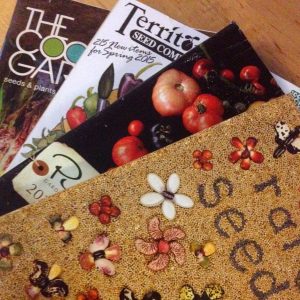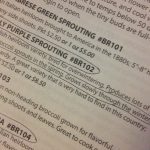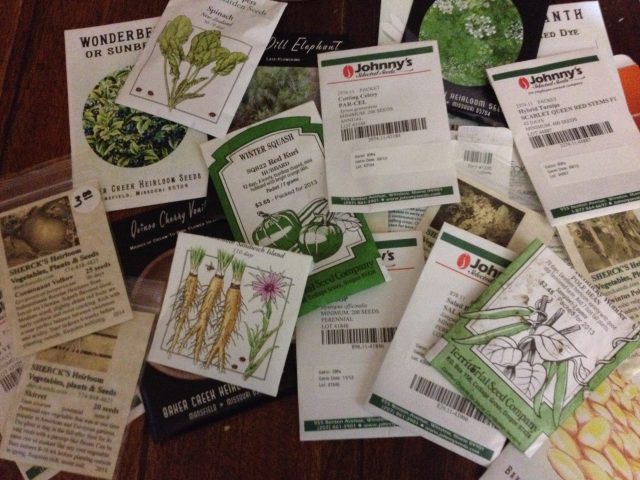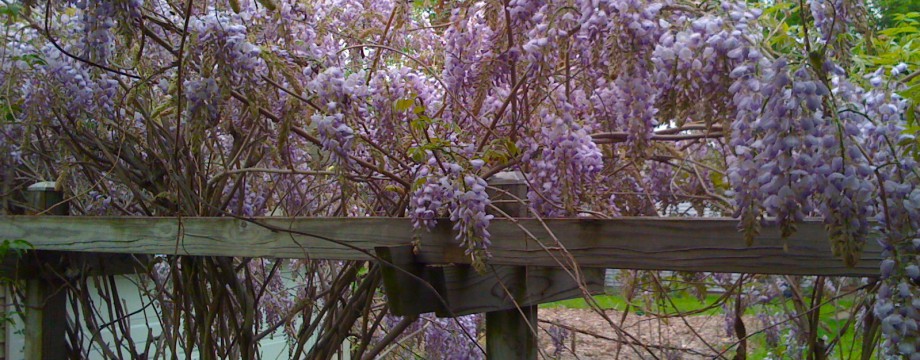It’s January, and that means that I am starting to get new seed catalogs. There isn’t much to do outside in the garden this time of the year, which makes it a perfect time to start planning what I want to plant in the spring.
I do most of my ordering online, but I do most of my seed selection through those paper catalogs that come in the mail. I spend hours poring over my favorite catalogs.
My new very favorite catalog is from Baker Creek Heirloom Seed Company. This catalog meets my criteria of having a great selection of heirloom and organic seeds and being aesthetically pleasing. But, in addition, it features quirky photographs of Baker Creek employees in wonderfully weird poses with vegetables. The catalog makes me smile every time I open it. It also makes me want to work there, except for the fact that I really don’t want to live in Missouri. Everyone looks like they are having so much fun!
As the winter progresses, my stack of favorite catalogs continues to clutter up the dining room table.
 I peruse each page of each seed catalog armed with pen, highlighter, and sticky notes. I circle and star those seeds that I am interested in and highlight features that catch my attention: “bred for overwintering”, “frost hardy”, “an excellent keeping variety”, “dating back to 1880”, “grown from seed provided by our Belorussian friend”, “good disease resistance”, “takes the heat and keeps producing all summer”, “easy to grow”, “very unique”, “high in vitamin C”. As usual, I’m drawn the unusual: Oaxacan Green Corn, Blue Tomatoes, Scarlet Kale. Emmer Wheat. Turkish Orange Eggplant. Sticky notes go on pages that I particularly want to go back to.
I peruse each page of each seed catalog armed with pen, highlighter, and sticky notes. I circle and star those seeds that I am interested in and highlight features that catch my attention: “bred for overwintering”, “frost hardy”, “an excellent keeping variety”, “dating back to 1880”, “grown from seed provided by our Belorussian friend”, “good disease resistance”, “takes the heat and keeps producing all summer”, “easy to grow”, “very unique”, “high in vitamin C”. As usual, I’m drawn the unusual: Oaxacan Green Corn, Blue Tomatoes, Scarlet Kale. Emmer Wheat. Turkish Orange Eggplant. Sticky notes go on pages that I particularly want to go back to.
In this first run through a catalog, I select anything and everything that looks interesting to me – much more than would ever fit in my garden. This first perusal is my time to be expansive and to dream big.
Eventually, though, reality hits. Even though I do have a large garden, it is not infinitely large. And my budget will not permit me to get everything that I have marked. So my second run through the catalog is a time to refine my selections. This is the time that I go through the catalog again, page by page. This is the time to start making lists. Until I make a list, I have no idea how many things have piqued my interest. Have I selected 20 seed packets or 200 seed packets? With random markings scattered in several 100–200 page catalogs, I have no way of knowing how expansive I’ve been.
 Now with my gardening journal and the seed catalogs next to me, I start writing down the list of seeds I want to purchase. Sometimes I have to make choices within a category: only one variety of carrot; only one variety of green bean, actually make that two varieties – one bush and one pole; lettuce – one mix suitable for hot weather and one mix suitable for cold weather. For each item in my list, I note from which catalog and on which page number that item can be found. The list can be long, usually is long, usually still too long. I still need to pare it down.
Now with my gardening journal and the seed catalogs next to me, I start writing down the list of seeds I want to purchase. Sometimes I have to make choices within a category: only one variety of carrot; only one variety of green bean, actually make that two varieties – one bush and one pole; lettuce – one mix suitable for hot weather and one mix suitable for cold weather. For each item in my list, I note from which catalog and on which page number that item can be found. The list can be long, usually is long, usually still too long. I still need to pare it down.
At this point in the process, I make a second list – the list of seeds that I have left over from the previous year.

I keep my seeds in the basement, in my canning pantry, where it is cool. I bring the box with seed packets upstairs and begin cataloguing the seeds I have. Then, looking at both lists, the “I have” list and the “I want” list) I make yet a third list, the “I still need” list. By the end of this process, I have a much more manageable list.
The final step in the process is looking at the cost. Now I write down the prices for all those packets on my “I still need” list and bring out my calculator. Horseradish root? Too expensive. Purple tomatillos? Maybe I’ll wait on that – after all, the regular green tomatillos will undoubtedly have reseeded themselves (they usually do). Eventually I have narrowed my selections down. To spread the love around, I often buy from 3–4 seed providers. I make up clean, easy to read lists of what I am ordering, go to my computer, and begin the actual buying.
Coming next month: In February, when my seed packets start arriving, I will look at my seeds and my garden plans, and start planning where I will plant those seeds.
